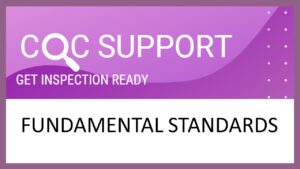I’m reading a book called Towards Outstanding – a Guide to Excellence in Health and Social Care by Terri Salt. Thankfully it’s an easy read and Terri includes loads of real life examples of her time working in this industry, having first-hand experience of inspections. I thought I would share some snippets from the book which I picked out, I’m halfway through the book, so will do a further review of the rest of the book later on.

Outstanding
Outstanding is something the practice is doing that would make a manager of a similar service want to drive over to see it for themselves. Can you think of something super special you’ve done or a team member has carried out that has had such a huge impact on a client or a fellow team member, that you’ve wanted to tell the world about? If you can, write a case study about it, an inspector will want to know.
They say ‘Outstanding’ is when staff have an absolute focus on the client and their loved ones, can describe all the individual needs and care preferences with client feedback being overwhelmingly positive.
Strengths
As a business owner, leader of your case management company, what do you feel is your greatest strength? Are you proud to be a manager leading a team of people, or do you feel this is something out of your comfort zone which you’re still getting to grips with and lay awake at 3.00am worrying about millions of things?
If the inspector asked what your strengths were – don’t forget to mention your ‘Culture’.
It’s so easy to say things like ‘fantastic teamwork’ and ‘the staff always go that extra mile’. Say the word ‘Culture’ and expand on this more, give a good example.
Technology
I loved this about the use of technology. This organisation decided to invest in the Virtual Reality headsets to fill client’ dreams – that good old ‘bucket list’. One client was able to fulfil his wish with a virtual skydive – how amazing that must have been for him. One client walked around the Great Wall of China using VR, again this must have been magical. What exciting wishes would your clients have that you could fulfil?

Observations with Necessary Critical Feedback
Asking someone you know, like a schoolteacher or a member of your local CCG you have a good relationship with, to do a visit with one of your clients, giving them chance to ask the client and the family what they think to your case management service. Explain that you are going through the CQC process of being inspected and you want an outside opinion of your business. A fresh pair of eyes, someone that will give you a frank and honest response. The ability to observe how you carry out your visits, how you interact with the client, how your support workers interact with the client. Gaining some critical feedback with observations of improvement.
How do you want to be Perceived?
As you don’t have premises for an inspector to visit like a care home establishment, where they can see how nicely presented your toilets are, your entrance hall and where the food is being prepared.
So apart from your website, your testimonials on LinkedIn, possibly recommendations on TrustPilot, how else do you paint a vision of your amazing company when the inspector comes to visit, most likely at your home office?
 Quality Assurance
Quality Assurance
Have you done a recent survey with team members and support workers, asking how much they enjoy working at your case management company, what they love doing?
Out of 10 (1 being miserable and 10 feeling really happy) – how do you feel about going to work each morning?
Out of 10 (1 being really worried and 10 feeling confident) – how concerned are you feeling about your work environment, the people you work with on a daily basis?
Do you feel your manager is really easy to approach and genuinely supports you giving an answer within a decent time period?
If you were asked this afternoon by an inspector what you love most about your work – what would you say?
Training Courses – have you really learned something?
When a member of your team attends a training course, are they genuinely happy to attend or feel it’s just a tick box exercise, something they must go to but don’t really feel it’s for them?
When they come back the next day, are they enthusiastic about what they’ve learned, can the tell you all about the course, what it entailed, what piece of advice really stood out and resonated with them?
Test to see if the support worker can remember key parts from their training course a month later, to see if it’s stuck in their mind and if they’ve used anything as part of their day to day tasks?
Morale and Motivation
How do you give your team or support workers the correct tools to do their job?
How do you empower them to problem solve, be confident in what they do without constantly asking you for advice and confirmation?
What impact does this have on your team’s morale and motivation?

Retaining Staff
How often do you genuinely tell your team members or support workers they’ve done a great job, that it’s really had an impact, something they should be proud of?
Retaining staff is a key skill to running a business and being a good leader – how do you feel you rate in this role? Do you feel you don’t have enough time to give to your team, to make sure they’re doing ok, feeling happy, feeling confident?
Can you honestly finish up at the end of the day, knowing full well all your team are pretty chilled, happy with their work, looking forward to going to work, have no concerns or worries?
Who do you talk to if you’re having problems, is there another case management colleague you lean on for support, someone who shares your woes and challenges on a day to day basis?
Provider Information Request (PIR)
Make sure you know and understand what this is.
It is factual but also an opportunity to really sell yourself and show the good work you and your team are doing. It does ask quite simple questions but try not to just answer with a yes or very short answer. Give more detail with evidence to support your answers. You can find some good hints and tips here.
Statutory Notifications – make sure you know these well.
Be very aware of these, a suggestion that a provider doesn’t know their requirements could go against them. At the same time over-reporting could flag up a lack of confidence with the regulatory requirements too.
 Fundamental Standards – get these fixed in our mind
Fundamental Standards – get these fixed in our mind
The more you understand these Regulations 4 to 20A, the better you’ll understand the whole process and how they interlink with the Key Lines of Enquiry and your policies.
As an example, with your Staff Development and Training Policy, it should include a paragraph something like this below.
This policy has been established to comply with the requirements of the Health and Social Care Act 2008 (Regulated Activities) Regulations 2014 in relation to Regulation 17: Good Governance, Regulation 18: Staffing and Regulation 19: Fit and Proper Persons Employed.
Benchmarking against your Competitors
You know who your competitors/colleagues are within the case management industry. Are you aware the CQC will benchmark you against similar services to yourself looking at the last 4 to 12 months? Always a good idea to look at the reports available on the CQC website of other case management companies that have already been inspected. Those reports give a really good insight and an idea of what they’re looking for and likely to ask you about too.
Honesty and Integrity – Duty of Candour
How do you develop an open, trusting and honest team at your company that acts with integrity?
In Terri Salt’s book she mentions Regulation 20: Duty of Candour which came about following the Francis Inquiry report into Mid Staffordshire NHS Foundation Trust. From this the CQC use these definitions below, a good way to discuss this with support workers in educating them further about the ‘Duty of Candour’.
- Openness – enable concerns and complaints to be raised freely without fear and questions asked to be answered.
- Transparency – allowing truthful information about performance and outcomes to be shared with staff, clients, the public and regulators.
- Candour – any client harmed by the provision of a healthcare service is informed of the fact and an appropriate remedy offered, regardless of whether a complaint has been made or a question asked about it.
Take a look at how the CQC regulate against the Duty of Candour.

Please keep things Simple
How many times have we read some kind of policy/document and got instantly turned off as it makes no sense, is full of jargon and too complicated even for a 6 year old to understand?
I would definitely prefer to see a sentence that reads super clear, no frills, can instantly make sense of it and leaves no room for ‘wonderment’ as in, does it mean this or does it mean that?
My thoughts are that mistakes/errors are more likely to take place if a set of instructions are just too complicated or confusing. The task won’t be taken seriously, your team will become frustrated and the work won’t get done. Make a job super easy to do and becomes a breeze.
Strapline – I love this it really hits the nail on the head!

Feeling Special
It’s not about fridge temperatures for the storing the medicine or neat staff records it’s about the impact of staff behaviour and attitudes on clients and those close to them. That sense of being something special. How do your support workers make the client they’re looking after, feel super special?
